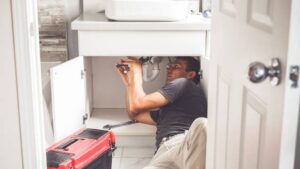Plumbers install, repair, and maintain the pipes, fixtures, and other equipment that deliver water and remove waste in homes and businesses. Plumbers Woodbridge NJ work with tools and heavy machinery and must follow building codes and safety protocols.
Plumbers usually enter the profession after completing a vocational school program or an apprenticeship. Many also pursue additional certifications to improve their skill sets and advance in the field.

Access to clean water is vital for our health and wellbeing. Plumbers ensure that the water we consume has undergone proper testing and treatment before it reaches our homes. They are also responsible for ensuring that water systems efficiently dispose of waste and prevent backflow of contaminants into drinking water supplies.
Clean water also helps to keep your home appliances like washing machines and dishwashers running at peak performance. This helps reduce energy costs and extends their lifespan by preventing damaging scale build-up. Furthermore, cleaning with clean water minimises the amount of soap and detergent you need to use.
While most people take clean water for granted, it is a basic need that many in the world lack. In fact, according to the United Nations, more than a billion people worldwide don’t have access to safe drinking water.
As a result, plumbing services are crucial in maintaining healthy and sustainable communities. Plumbers are key to providing clean water for their customers by ensuring that water pipes are well-sealed and functioning properly, as well as ensuring that wastewater is safely disposed of. Plumbers can also install water filtration systems to improve tap water quality and provide a fresher taste. Water filtration systems can also help remove harmful impurities like sediment, chlorine, and heavy metals. In addition, plumbers can assist with septic system installation and maintenance for households that are not connected to the public sewer system.
Probably the most important job of a plumber is separating clean water from harmful contaminants. This is especially important because the health of our bodies and environment depends on having access to clean water. If contaminants make their way into our drinking water, they can cause serious illnesses. Thankfully, plumbing systems are designed to separate these contaminants from our clean water sources. And when something goes wrong with this process, plumbers can often fix it.
One of the most common contaminants in drinking water is sewage. Sewage is the waste that comes from toilets, baths, and kitchen sinks. It also includes wastewater from washing machines, dishwashers, and kitchen appliances. Plumbers help to reduce sewage waste by installing and repairing septic systems, cesspools, and greywater treatment systems. They can also repair or replace leaking pipes and toilets that waste water into unintended places.
Another way that plumbers help to reduce waste is by using leftover materials from previous jobs on new projects. This helps to cut down on the amount of waste that is sent to landfills and can save money for both plumbing companies and their customers. For example, if you are replacing a section of pipe, it is often cheaper to use the old part rather than buying a whole new one. This also saves on shipping costs and cuts down on waste.
When it comes to garbage disposals, plumbers can often fix clogged drains and pipes without having to resort to harsh chemicals. Instead, they recommend using ice chips and baking soda. The ice helps to break up any food scraps, and the baking soda removes odors. These are both safer and more effective options than chemical-based products.
It is also a good idea to avoid putting certain items in your garbage disposal, including celery string (which can clog the drain), egg shells, and potato peels. A professional plumber can give you a list of foods that are safe to put in your disposal, as well as ones to avoid.
While many of us rely on plumbers to maintain our plumbing systems and keep them running smoothly, it’s important to remember that we can all do a little bit to reduce waste. Practicing water conservation, avoiding wasteful activities, and recycling whenever possible can all help to preserve our planet for generations to come.
A healthy environment is a prerequisite for human health and well-being. It includes natural environments as well as structures like homes and buildings. Research has found that the built environment can have a stronger impact on humans than previously thought. It can promote or hinder good health, depending on how it is designed and maintained. For example, a house with leaky pipes can lead to mold and mildew growth that deteriorates indoor air quality. This can cause respiratory problems for people who live in the home. On the other hand, a house with energy-efficient appliances and plumbing fixtures can save money on utility bills while also promoting environmental sustainability.
Plumbers are a vital part of a sustainable environment, as they work to promote and install green plumbing solutions in homes and businesses. These include water-efficient fixtures such as low-flow toilets and faucet aerators, which reduce water usage without compromising performance. Additionally, plumbers can help homeowners to insulate their pipes to further decrease energy consumption.
Another way that plumbers can contribute to a healthy environment is by encouraging the use of recycled materials in construction projects. This helps to reduce the amount of waste that is sent to landfills and increases the lifespan of the materials. Plumbers can also provide advice on how to recycle household items such as paper, plastic, and old pipes.
Proper plumbing maintenance and prompt repairs can also improve the overall indoor air quality in a home or business. Leaking pipes can promote the growth of mold and mildew, which release spores that can trigger allergies and other respiratory problems. In addition, sewage leaks can contaminate the clean water supply and pose a serious health risk. Regular plumbing repairs can eliminate these issues and prevent them from occurring in the first place.
Many homeowners overlook the importance of a healthy environment, but this is an essential aspect of life. It is important to have a clean, safe, and comfortable living space for yourself and your family. If you notice any issues with your plumbing, call a professional plumber right away to address the problem and make sure that your home or business is in good condition.
Plumbers work in various environments and may come into contact with a variety of chemicals. It’s important for them to know how to handle these substances safely, including reading and following the instructions on chemical labels, wearing proper protective gear, and decontaminating tools before and after use. They should also take precautions when working in tight spaces, such as crawl spaces and utility tunnels. These areas may contain oxygen-deficient atmospheres and/or hydrogen sulfide, which can be toxic at high levels.
It is essential for plumbers to make sure that the power is turned off before starting any work on electrical systems. This can help avoid electrocuting themselves or others who might be using the facilities. They should also wear non-slip shoes and have a face mask to protect their eyes and lungs from dust and other particles that can be hazardous to their health.
Plumbing work often requires entering confined spaces, such as crawlspaces and basements. These areas can be difficult to access and work in, so plumbers should be familiar with the hazards and use a buddy system when possible. They should also read and follow confined space procedures, such as avoiding toxic gas buildups by ensuring there is adequate ventilation, and that all workers wear appropriate personal protective equipment (PPE).
The job of a plumber can be dangerous because it involves working with electricity, confined spaces, and sharp objects. To reduce the risk of injury, plumbers should wear gloves, a face mask, and safety glasses. They should also ensure that all tools are in good working condition.
Lastly, plumbers should always keep a first aid kit handy in case of any accidents or injuries. Also, they should check that the water supply is switched off before beginning their work.
Creating a health and safety policy is an important step in setting up a safe workplace. Make sure that all new employees receive initial training before they begin work, and schedule regular refresher courses for ongoing safety and health compliance. Jobber’s custom safety checklists can help you identify potential risks, and our field service management software allows you to view and analyze key performance indicators to see if there are any underlying issues affecting your plumbing team’s productivity or health and safety.
